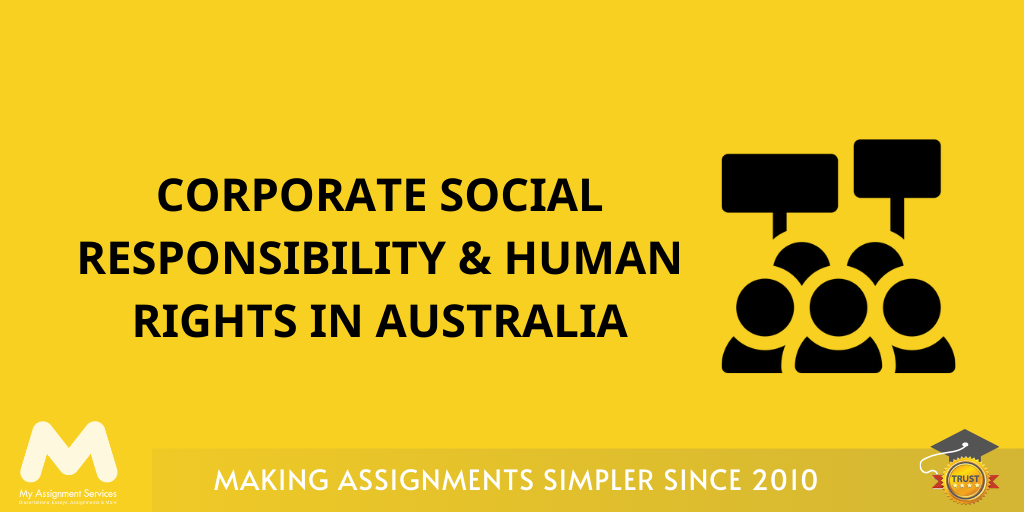
Corporate Social Responsibility a.k.a. CSR, Corporate Accountability, Corporate Responsibility, etc., is the idea and acknowledgment of the fact that corporations, large or compact, have a bearing upon the social, economical, and environmental aspects of the world. In other words, CSR is a form of universal private undertaking self-regulation that intends to make contributions in societal, economic, and environmental development through philanthropism, corporate activism, and ethical practices - as a part of their fundamental duties towards it. However, quite naturally, because CSR is more of a moral duty, with differing semantics in different contexts, it is not enforceable to a great extent. Let's talk about corporate social responsibility assignments later on, and pick up the next big area of interest that needs to be shed light on, i.e., Human Rights.
Human rights, on the other hand, rests at the center of the economic, social, and environmental features of the corporate, by virtue of which it is aboundingly pertinent. For instance, labor rights have made it compulsory for corporates to pay fair wages to all their employees and avoid exploitation that has a history of cropping out of it. This intricately influences the specific economic dimensions that we are talking about. Human rights also profess the right to non-discrimination based on all or any of the identities people held, which is pertinent in the social dimensions. Similarly, the environmental dimensions of corporate activities may influence an array of basic human rights, for instance, the right to have clean air, and clean and safe drinking water.
Our focus in this blog is where the two ideas and their respective repercussions converge, i.e., in Australia. What's about it? To begin with, although the foremost responsibility in the 'enforcement' of universal human rights standards rests with the Australian national government, there has been a heightened embracing of the fact that the Australian corporations must also be equally responsible for the enforceable implementation. It is because the Australian corporations' effect on human rights has been on the rise due to the enormous financial power and political control they subsumed in the recent decades, which has also led to increasing Privatization.
Surprisingly, the Australian corporations, on the other hand, have acknowledged the importance of being a responsible corporate body, with the highest regard for the human rights of everyone who comes into association with the corporation directly or indirectly. And so are the Australian corporations acknowledging the fact that a large number of investors and consumers anticipate them to function in a socially and environmentally sustainable manner. As a result, the scope up to which a business implements and enforces an extensive Corporate Social Responsibility program is now capable of positioning the customers as well as the investors in their decision-making.
Where does Corporate Social Responsibility stand in the international arena?
In a matter of a few decades, the global community has been able to significantly tread into probing and demystifying the connections between human rights and corporations. A huge number of voluntary schemes have also been designed by independent companies, NGOs, stakeholder groups, and inter-governmental organizations. Such schemes involve voluntary guidelines, special instructions, COCs, surveilling and reporting methods, and socially and environmentally sustainable report indices, etc.
Under the influence of these voluntary action plans, tons of corporations around the world have promulgated to bolster human rights standards. Such a massive response signifies the swelling acceptance of the requirement for internationally dispersed corporations to converge on the subject of CSR and Human Rights, and secure the interests of their consumers, employees, and shareholders.
What about Australian corporations?
In the year 2006, the Corporations and Financial Services, and the Corporations and Markets Advisory Committee's legislative bodies, known as the Parliamentary Joint Committee on the same issues, had hosted inspections into diverse facets of corporate responsibility set in the backdrop of Australian culture and society. The committees were in accord that it is a critical aspect for the Australian corporate.
As a part of continuing the international status of CSR and its enforcement, several Australian laws have been set in effect, for corporations to adhere to, in the realization of the human rights standards. Although these laws, strictly speaking, are not often drafted in the politically correct language of human rights, at least the level they specify is rather founded on human rights. Instances may include the laws that inhibit harassment and discrimination in workplaces, as well as the ones that require employers to offer equal opportunities in employment. These laws are built around the ideals of non-discrimination and equality. The laws encircling the supervision of work conditions have also been in place, for instance, conditions of employment, occupational health, and safety, fair wages, disbanding of child labor, etc. These laws have been much efficient in combating the cause of labor exploitation. Even the laws that have been punishing corporations with liability for undertaking conduct that goes against tenets of human rights, e.g. bribery, war crimes, or crimes against humanity.
On top of the human rights standards that we talked about, which the Australian companies have been adopting, several other human rights are pertinent to corporate affairs. Based on the various affairs undertaken by corporations, these may encompass
-
Right to freedom and personal security
-
Right to have a quality of life
-
Right to educate oneself
-
Right to health and hygiene
-
Right to expression
-
Freedom of faith
-
Rights of the aboriginals and the marginalized, etc.
Conclusion and the ways forward
Given the detailed account of the advancements that have been made by Australia in securing Human Rights through implementation, and enforcement of Corporate Social Responsibility, it can be concluded that Australian corporations have come a long way. Further, it can also be safely said that greater involvement of the corporate sector in the process, and in inculcating the responsible character within their organizations, can indeed make a big difference. Now, for those who were here for corporate social responsibility assignment help, we believe after reading the blog, you have got an idea of how meaningful your work needs to be. However, in case you are still not sure and intend to consult expert scholars and veteran industry professionals before making a move, they may reach out to us.
Related Study Materials
Our Experts can answer your Assignment questions instantly.
Ask Question0 Comment
Get It Done! Today
1,212,718Orders
4.9/5Rating
5,063Experts












Loved reading this Blog? Share your valuable thoughts in the comment section.
Add comment